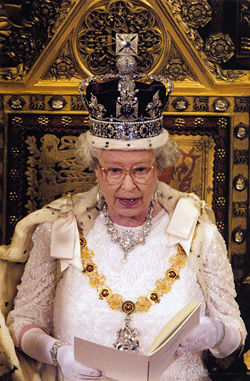Monarchy of the United Kingdom

The monarch visits Parliament annually in a ceremony to begin parliamentary proceedings. During this State Opening of Parliament, the Queen's Speech sets out her government's intentions for the coming year.
The monarchy in the United Kingdom and its territories is an institution which provides the British head of state as a king or queen with ceremonial powers. The government of the United Kingdom runs the country in the name of the monarch. The monarchy is therefore a constitutional monarchy, having no real political power, but the Royal Family performs a variety of duties. Since 1952 the head of state has been Elizabeth II, one of the longest-reigning monarchs in world history. She is also Queen of Australia, New Zealand, Canada and 12 other sovereign nations, as well as being head of the Commonwealth of Nations and the Church of England.
The British monarchy is hereditary, in that the eldest son of the monarch has usually become King. For centuries, a daughter would only become Queen if she had no brothers. However, on 28th October 2011, the Queen's 16 prime ministers agreed to bring in legislation to change this. The current heir apparent to the throne is Charles, Prince of Wales.
History
- (Links to records of the events referred to in this paragraph are available in the detailed chronology on the timelines subpage.)
The monarchy as it is now, is the outcome of two historical developments. One was the unification of the local kingships in the various parts of what is now the United Kingdom. The other was the transfer of decision-making power from the monarchy to parliament. The concept of a single ruler unifying different tribes based in England developed in the eighth and ninth centuries in figures such as Offa and Alfred the Great, who began to create centralised systems of government. That process was complete by the time of the Norman Conquest, and it was followed over the following centuries by unification developments involving Wales, Scotland and Ireland. The Norman occupation of Wales was completed in the early 15th century, and its constitutional integration with England was established by the Laws in Wales Act of 1535 and 1542. The unification of Scotland under a single monarch took shape with the establishment of the Stewart dynasty in the 14th century, its monarchy was merged with England's in the early 17th century, and the unification of the two constitutions was completed by the Act of Union of 1707 - with the creation of what has since been known as "Great Britain". Unification with Ireland was completed by the Act of Union of 1801, and the "United Kingdom of Great Britain and Ireland" lasted thereafter until the Anglo-Irish Treaty of 1922, when it was replaced by the present "United Kingdom of Great Britain and Northern Ireland". The transfer of decision-making powers began with the the monarch's assent to the "Magna Carta" of 1215, and was formally completed by the "Glorious Revolution" and the Bill of Rights of 1688, although monarchs continued to influence government policy until the end of the reign of Queen Victoria in 1901.
The rôle of the monarch
Political
The British monarch is the country's head of state. The Sovereign, as its embodiment, has the right to advise the Prime Minister in private. The Sovereign also has the personal power to resolve an otherwise intractable constitutional crisis but is bound, in all other circumstances, to give way to ministerial advice. In other respects, the royal prerogative, which includes the power to declare war, is effectively exercised by ministers. The Royal Prerogative includes the right to be consulted by Ministers - a right which has traditionally been exercised by a weekly audience with the Prime Minister, the contents of which are strictly confidential. (The present Queen has held weekly meetings with each of her eleven prime ministers, or has had telephone conversations with them when meetings have not been feasible. Three past Prime Ministers have spoken of the value to them of those conversations[1].) The Monarch is also has the nominal rôle of "Supreme Governor" of the Church of England with the power of appointment of bishops - a rôle that in reality is performed by the Prime Minister[2]. The ancient feudal functions of the monarchy continue to be reflected in constitutional and legal terminology and usage. For those purposes, the term "The Crown", refers to a legal fiction that makes the state a legal entity that can be a party to a legal transaction or a legal action[3].